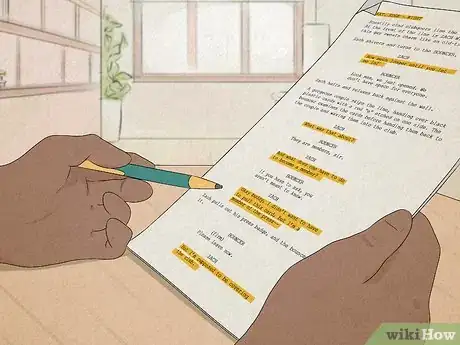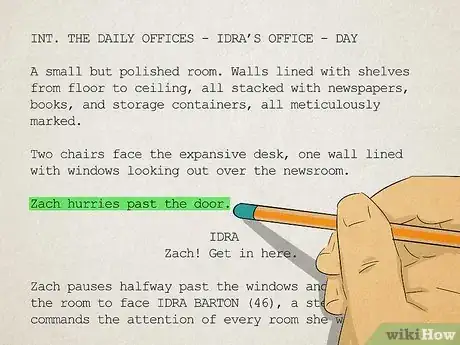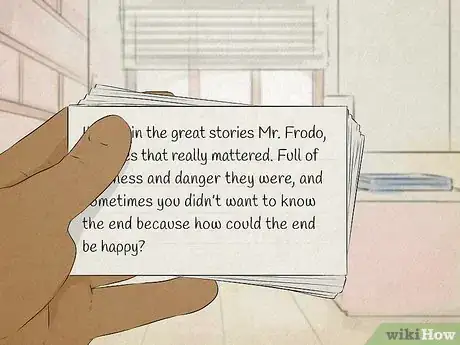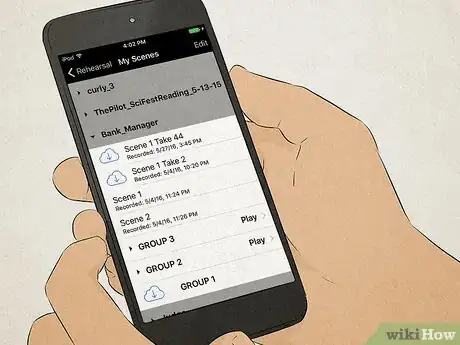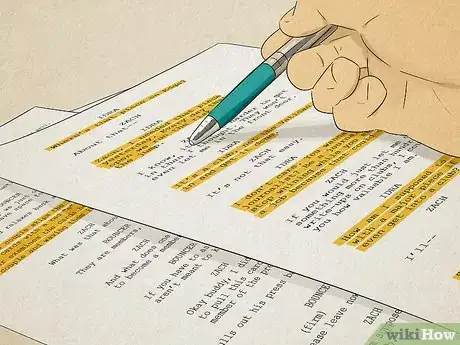This article was co-authored by Lesly Kahn, MFA and by wikiHow staff writer, Eric McClure. Lesly Kahn is an acting teacher and coach based in Los Angeles, California. She is the founder and owner of Lesly Kahn & Company, Actor Training, which focuses on preparing actors for employment in film, television and theatre. With well over 30 years of experience, Ms. Kahn has coached hundreds of actors who have become household names. She also ran the BFA Program in Acting at Marymount Manhattan College, and worked in television as well as New York and regional theatre. Lesly holds a BFA from New York University and an MFA from The Yale School of Drama.
There are 10 references cited in this article, which can be found at the bottom of the page.
wikiHow marks an article as reader-approved once it receives enough positive feedback. This article has 17 testimonials from our readers, earning it our reader-approved status.
This article has been viewed 491,217 times.
Learning you landed that leading role will have you jumping for joy, but then it hits you: now you have to memorize all of those words! While it seems daunting at first, rest assured that thousands upon thousands of actors before you have been right where you are right now, and you will get these lines down. It’s also important to recognize that this isn’t really difficult so much as it’s just time consuming, and if you’re willing to put the time in, you’ll master your lines no problem.
Steps
Community Q&A
-
QuestionHow do I memorize my lines better?
 Community AnswerPractice daily and record yourself reciting your lines so you can listen to the recording frequently.
Community AnswerPractice daily and record yourself reciting your lines so you can listen to the recording frequently. -
QuestionHow many lines per day should I try to learn?
 Community AnswerDivide the number of line you have by the number of days you have to learn them. If you have ten days to memorize one hundred lines, do ten lines per day. You may want to give yourself a day or two of extra time as a cushion in case you find it difficult to put it all together.
Community AnswerDivide the number of line you have by the number of days you have to learn them. If you have ten days to memorize one hundred lines, do ten lines per day. You may want to give yourself a day or two of extra time as a cushion in case you find it difficult to put it all together. -
QuestionHow many lines can a beginner memorize?
 Community AnswerIt depends on how much time and effort the beginner puts into the memorizing. It also depends on how good the person is at memorizing things in general. He or she may have to try different techniques, from writing down the lines repeatedly to practicing them over and over, before finding one that works.
Community AnswerIt depends on how much time and effort the beginner puts into the memorizing. It also depends on how good the person is at memorizing things in general. He or she may have to try different techniques, from writing down the lines repeatedly to practicing them over and over, before finding one that works.
References
- ↑ https://www.chicagotribune.com/entertainment/theater/ct-how-actors-memorize-lines-column.html
- ↑ https://www.backstage.com/magazine/article/backstage-experts-answer-ways-quickly-memorize-lines-6719/
- ↑ https://www.chicagotribune.com/entertainment/theater/ct-how-actors-memorize-lines-column.html
- ↑ https://www.apa.org/science/about/psa/2005/02/suzuki
- ↑ https://www.chicagotribune.com/entertainment/theater/ct-how-actors-memorize-lines-column.html
- ↑ https://nhmu.utah.edu/sites/default/files/attachments/Memorizing%20Your%20Script.pdf
- ↑ https://nhmu.utah.edu/sites/default/files/attachments/Memorizing%20Your%20Script.pdf
- ↑ https://www.backstage.com/magazine/article/backstage-experts-answer-ways-quickly-memorize-lines-6719/
- ↑ https://www.ncbi.nlm.nih.gov/pmc/articles/PMC3536268/
- ↑ https://www.chicagotribune.com/entertainment/theater/ct-how-actors-memorize-lines-column.html
- ↑ https://www.inc.com/fia-fasbinder/need-to-memorize-a-speech-heres-neuroscience-behind-it-and-3-apps-to-help.html
- ↑ https://www.dailyactor.com/how-to-memorize-lines/
- ↑ https://www.smithsonianmag.com/science-nature/experiments-show-we-really-can-learn-while-we-sleep-141518869/
- ↑ Lesly Kahn, MFA. Acting Teacher & Coach. Expert Interview. 12 May 2020.
- ↑ https://dramatics.org/making-it-stick/
- ↑ https://nhmu.utah.edu/sites/default/files/attachments/Memorizing%20Your%20Script.pdf
- ↑ https://www.backstage.com/magazine/article/backstage-experts-answer-ways-quickly-memorize-lines-6719/
About This Article
If you are having trouble memorizing your lines, there are a few tips you can use to remember your script. Start by highlighting or underlining your lines so you can find them easily when you look over your script. Once you find all of your lines, try writing them out on a separate piece of paper or typing them on your computer. You can do this several times as you work on memorizing your part. Another way to remember your lines is to practice reading them out loud in different ways, like happy, sad, loud, or quiet. You can even try singing your lines since setting them to music can make them more memorable for you. If you’re having a hard time remembering all of your lines at once, break the script up into sections and try tackling one small part at a time, like page by page or scene by scene. To learn how to memorize your lines with the help of an audio recorder, keep reading!
